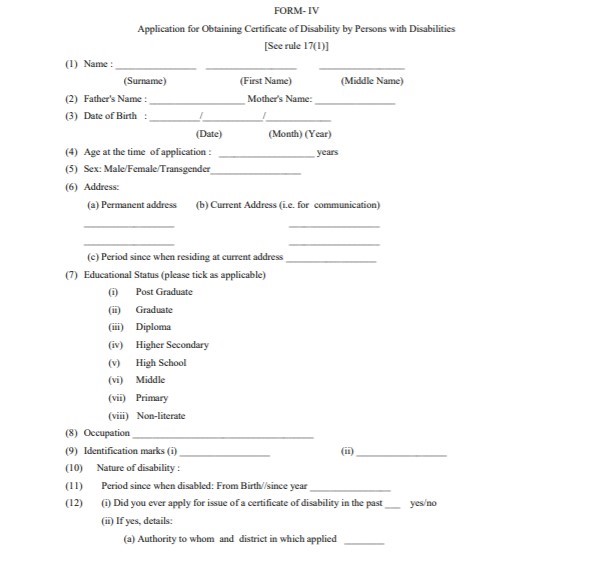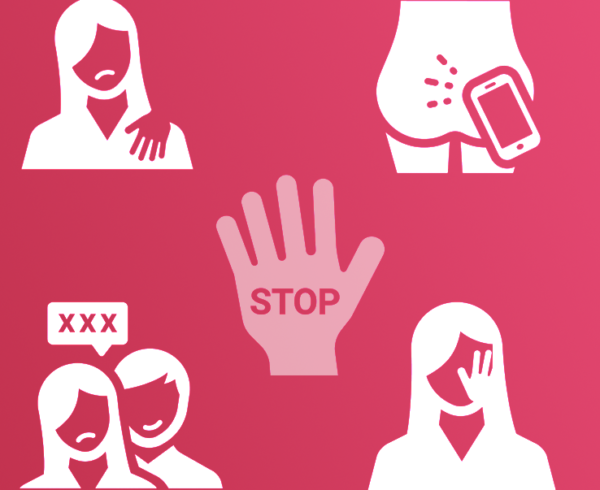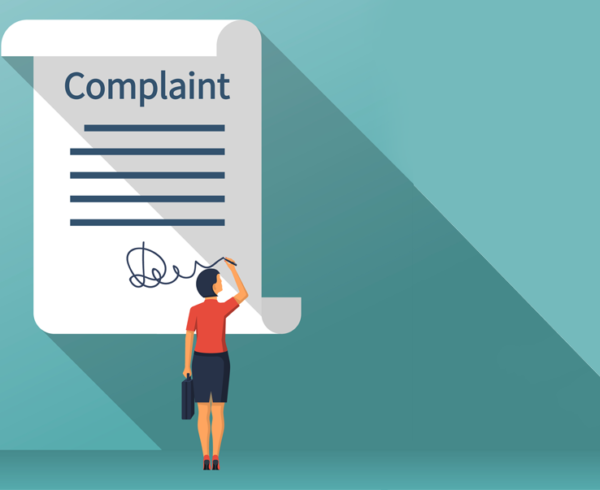How can the guide help you?
The Nyaaya Guide for Persons with Disabilities at the Workplace helps persons with disabilities (PwDs) understand their employment rights and associated remedies.
What are the laws being discussed in the guide?
This guide discusses the rights of persons with disabilities outlined in the Constitution of India, 1950, The Rights of Persons with Disabilities Act, 2016 (PwD Act), The Rights of Persons with Disabilities Rules, 2017, and the Income Tax Act, 1961.
Who is a person with disability?
A person with disability is a person with long-term physical, mental, intellectual or sensory impairment, which restricts their full and effective participation in society equally with others.
Who is a person with “benchmark” disability?
A person with benchmark disability is someone who has at least 40% of a specified disability.
Specified Disabilities include:
1. Physical Disability
- Locomotor Disability: Inability to perform activities associated with movement. People with locomotor disability include those with cerebral palsy, dwarfism, muscular dystrophy, acid attack victims, etc.
- Visual Impairment: A condition of blindness or low vision.
- Hearing Impairment: Deafness or loss of hearing.
- Speech and language disability: Permanent disability affecting speech and language.
2. Intellectual Disability
Significant limitation in intellectual functioning (reasoning, learning, problem solving) and adaptive behaviour (everyday social and practical skills) including specific learning disabilities and autism spectrum disorder.
3. Mental Illness
Substantial disorder of thinking, mood, perception, orientation or memory that severely impairs judgement, behaviour, capacity to recognise reality or ability to meet the ordinary demands of life. This does not include mental retardation.
4. Disability caused due to
- Chronic neurological conditions: Multiple sclerosis, Parkinson’s disease
- Blood disorders: Haemophilia, Thalassemia, Sickle cell disease Multiple Disabilities: More than one of the above specified disabilities.
- Any other disability specified by the Central Government.
Disability Certificate
Why should you apply for a Disability Certificate?
A Disability Certificate gives you the right to apply for facilities, concessions and benefits under schemes put in place by the Government, and Government-funded
NGOs for persons with disabilities. The certificate is valid throughout India.
How can you apply for a Disability Certificate?
The Government specifies qualified and experienced people as certifying authorities competent to issue the Disability Certificate. Anyone with a specified disability can apply (using Form-IV) for a certificate of disability to:
- a medical authority or other competent authority in the district where the applicant lives (according to the proof of residence in their application); or
- the concerned medical authority in a government hospital where they are undergoing or have undergone treatment for their disability.
A legal guardian or concerned registered organisation can apply on behalf of a minor or a person unfit or unable to make the application themself.
See “Form-IV” in References here.
Find the nearest medical authority here.
What are the documents required with the application?
Attach the following with the application:
- proof of residence;
- two recent passport size photographs; and
- Aadhaar number or Aadhaar enrollment number, if any.
Decision of the authority
The concerned authority will verify the information and assess the disability. If the authority thinks the applicant is a person with disability, they will issue a certificate of disability within a month. This could be a permanent certificate of disability, or a certificate with a validity period if the disability might vary over time. For example, if an employee has a hand injury which would take one year to heal, the authority could issue a temporary certificate of disability valid for one year.
If the authority finds the applicant ineligible, they will communicate this to them in writing within one month.
Can you appeal against the concerned authority’s decision?
Yes, if you are dissatisfied with the authority’s decision to deny the certificate, you can appeal against this to the concerned authority specified by the State Government.
Unique Disability ID (UDID)
What is a Unique Disability ID (UDID)?
You can now apply for a Unique Disability ID (UDID) in the form of the
Swavlamban Card. A UDID (Swavalamban) Card contains all necessary details and is a single document for identification and verification of a person with disability for getting various benefits.
You can use the UDID online portal to:
- Apply for Disability Certificate and UDID Card
- UDID Card renewal
- Apply for a lost UDID Card
- Download e-Disability Card and e-UDID Card
How to apply for UDID Card if you do not have a Disability Certificate
Fill an online application and attach scanned copies of the required documents. Choose the option “No” to “Have Disability Certificate?” in the Disability Details Tab while filling up the application, and submit the application.
How to apply for UDID Card if you have a Disability Certificate
If your data has been migrated to the UDID Portal, click “Already having Disability Certificate” and provide Beneficiary ID/State ID or Aadhaar Number (if linked), other details, fill up the application and submit.
If your data has not been migrated to the UDID Portal, fill up a fresh application and select the “Yes” option to the question “Have Disability Certificate?” In the Disability Details Tab, fill up other details and submit the application.
Rights of PWD
What are the Employment-related Rights for a
Person with Disability under the Constitution?
Right to Equal Opportunity
All citizens must have an equal opportunity in matters related to employment or appointment to Government positions. The Government can also make provisions for reserving appointments or posts for any backward class of citizens who are not adequately represented in Government services.
Government’s responsibility
The Government should try to make effective provisions and provide public assistance for persons with disabilities to secure employment.
What are the Employment-related Rights under the PwD Act?
Right to Vocational Training and Self Employment
Under Government schemes and programmes, persons with disabilities can get loans at concessional rates to support their employment, especially vocational training and self employment.
These schemes try to:
- Include persons with disabilities in all mainstream formal and non-formal vocational and skill training schemes and programmes;
- Ensure that a person with disability has adequate support and facilities to avail specific training;
- Provide exclusive skill training programmes for persons with disabilities with active links with the market, for those with developmental, intellectual, multiple disabilities and autism;
- Market products made by persons with disabilities; and
- Maintain data on the progress made in the skill training and self employment of persons with disabilities.
Right against Discrimination
Government establishments should not discriminate against persons with disabilities in employment. However, depending on the type of work, the Government might exempt an establishment from this requirement. For employees with disability, Government establishments:
| Should | Should not |
| Make reasonable adjustments and provide an appropriate barrier-free environment which is helpful for persons with disabilities. This involves designing physical spaces and information systems in such a way that persons with disabilities can easily access them. | Deny promotion only on the ground of disability, or sack an employee who acquires a disability during their service. |
If an employee is not suitable for the post after acquiring a disability, the employer can shift them to some other post with the same pay scale and service benefits. If it is not possible to adjust the employee against any post, the employer can keep them on an additional post until a suitable post is available, or till the age of retirement (whichever is earlier).
The Bombay High Court ordered a government employer to pay back wages to employees with disabilities from the date that their respective services were discontinued until the date that they were provided with an alternative position.
Right to Reservation in Employment and Promotion
Every Government establishment should keep aside at least 4% of total vacancies in the cadre strength in each group of posts for persons with benchmark disabilities. However, depending on the type of work, the Government might exempt an establishment from this requirement.
Out of the 4%, 1% each must be reserved for the following categories:
- blindness and low vision;
- deaf and hard of hearing;
- locomotor disability including cerebral palsy, leprosy cured, dwarfism, acid attack victims and muscular dystrophy.
- autism, intellectual disability, specific learning disability and mental illness, multiple disabilities.
If a suitable person with benchmark disability is not available for recruitment in a year, the employer will carry forward their vacancy to the succeeding recruitment year. If they are unavailable in the succeeding recruitment year also, the employer can take the Government’s approval to first fill the vacancy by interchange among the different categories. The employer can fill up the vacancy by appointing someone other than a person with disability only if there is no person with disability available for the post that year.
The reservation in promotions will be according to Government instructions.
Special Employment Exchange and Unemployment Allowance
The Government maintains offices or places as “Special Employment Exchange” for collecting and giving information about—
- employers who want to employ persons with disabilities;
- persons with benchmark disability seeking employment;
- vacancies for persons with benchmark disabilities seeking employment.
For the Special Employment Exchange, the Government can order private and Government employers to give information about their vacancies for persons with benchmark disability.
The Government can make schemes for providing unemployment allowance to persons with disabilities registered with Special Employment Exchange for more than two years and not placed in any gainful occupation.
Employment in the Private Sector
The Government tries to provide incentives to private sector employers to ensure that at least 5% of their workforce is composed of persons with benchmark disability.
For example, a Government scheme under which employers need not deposit the EPF/ESI contribution for their PwD employees.
What are the Rights of a Person with Disability under Income Tax laws?
Under Section 80 DD, any expenditure by an individual or Hindu Undivided Family resident in India on the medical treatment (including nursing), training and rehabilitation etc. of dependants with disability can be deducted, up to Rs. 75,000, or Rs. 125,000 in case of severe disability (80 %).
Under Section 80U, a person with disability resident in India can claim a deduction of up to Rs. 75,000, or Rs. 125,000 in case of severe disability (80 %).
How to file a complaint for violation of rights?
Anyone who feels that a Government establishment is discriminating against persons with disabilities can file a complaint with the Grievance Redressal Officer (GRO) (appointed in every Government Establishment).
The GRO will investigate the issue within two weeks and take up the matter with the establishment for corrective action. The GRO will also maintain a register of complaints.
If someone is not satisfied with the action taken on their complaint, they can approach the District-Level Committee on Disability.
What is the punishment for violating the law?
| Crime | Punishment |
| Violating any provision of the PwD Act or Rules | First offence – Fine up to Rupees ten thousand
Subsequent offences – Fine of Rupees fifty thousand to five lakh |
| Fraudulently getting benefits meant for persons with benchmark disabilities | Jail time up to two years and/or fine up to Rupees one lakh |
| Atrocities such as:
● Intentionally insulting or intimidating a PwD to publicly humiliate them ● Assaulting a PwD to dishonour them, or outraging the modesty of a woman with disability ● Using one’s position to sexually exploit or dominate the will of a child or woman with disability ● Voluntarily injuring, damaging, or interfering with the use of any limb or sense or supporting device of a PwD |
Jail time of six months to five years and a fine |
Resources
Schemes
- Divyangjan Swavalamban Yojana: Providing concessional credit to start any income-generating, pursuing vocational or skill development, etc.
- Prerna: Marketing assistance for products made by persons with disabilities
- State-wise schemes here
Source of Information
Rights of Persons with Disabilities Act, 2016
Rights of Persons with Disabilities Rules, 2017 http://www.swavlambancard.gov.in/
http://disabilityaffairs.gov.in/content/
Glossary Terms
Person with Disability: A person with disability is a person with long-term physical, mental, intellectual or sensory impairment, which restricts their full and effective participation in society equally with others.
Sample Forms
Form IV for applying for Disability Certificate









Leave a Comment